| Date | 2019-07-26 |
|---|
As the US-China trade war heats up and plunges the world into an economic slowdown, Thailand urgently needs to review trade policies to save its export-dependent economy.
“One thing is clear. The trade wars between the world’s two biggest economies will drag on for a long time. There will be an economic slowdown across the globe and severe impacts on the supply chains,” said Dr Somkiat Tangkitvanich, president of Thailand Development Research Institute (TDRI), Thailand’s policy think tank.
“The sooner we act to minimize the fallout and look for new trade opportunities, the better.”
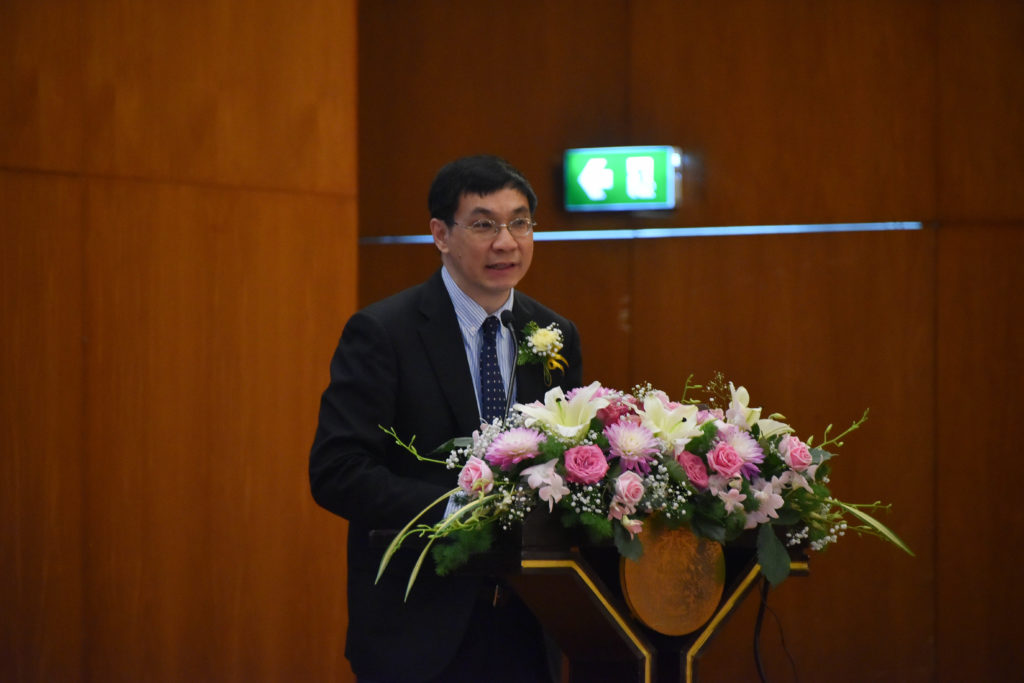
Dr. Somkiat Tangkitvanich president of Thailand Development Research Institute (TDRI)
Since the Thai economy is heavily dependent on China, it is inevitably affected by the slowdown. To lessen the impacts of the protracted trade wars, this is what Thailand must do, he urged:
Reduce economic risks from the current overdependence on China’s economy. Expand trade in ASEAN which is now Thailand’s biggest export market. Increase access to other markets through active trade negotiations. Help the private sector prepare for change. Fairly distribute the costs and benefits of trade by addressing legitimate public concerns including the rising costs of healthcare and farming.
Dr Somkiat advocated trade policy reviews during a seminar on “Thailand’s Options under Trade Wars” co-organised by TDRI and the Ministry of Foreign Affairs which is in charge of reviewing the Japan-Thailand Economic Partnership Agreement (JTEPA) after being in force for a decade.
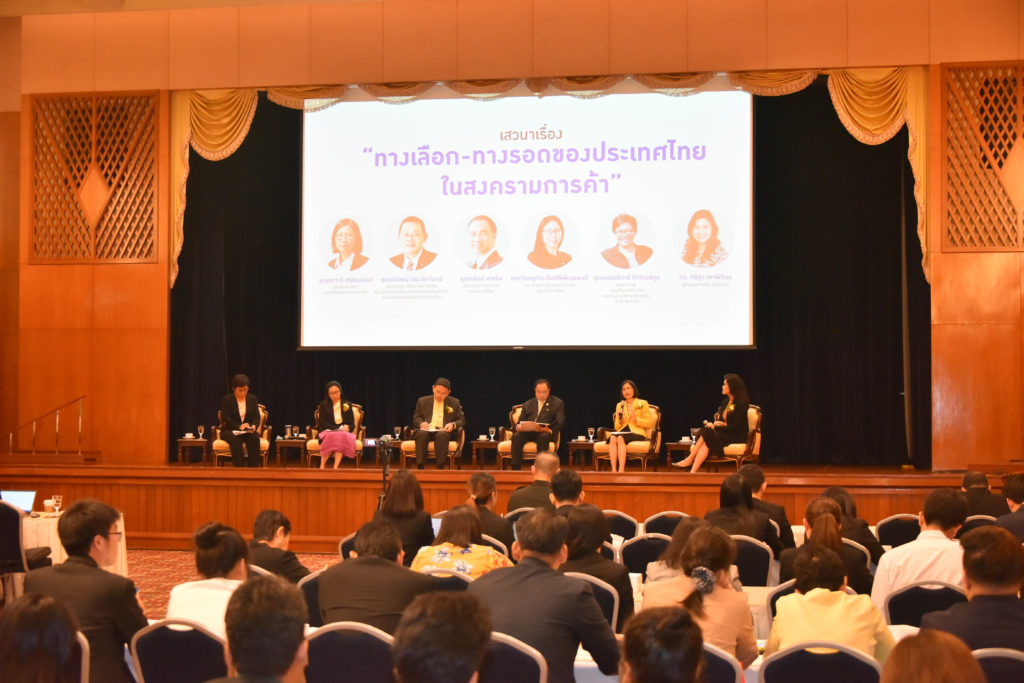
The seminar on July 26, 2019 at the Ministry of Foreign Affairs also saw high-ranking official in trade negotiations as well as business and civic leaders discussing the benefits and limitations of free trade agreements.
Understanding trade wars
One year after the tit-for-tat trade wars, US export to China has declined by 38% while China’s export which faces higher taxes has declined by 13% in the items that face higher tariffs. “Both economies suffer. So do the countries and businesses which are in their supply chains,” he said.
“Conflicts happen throughout history whenever a hegemonic power is challenged by a new power centre. This is sometimes referred to as the Thucydides trap,” Dr Somkiat explained.
During the past five centuries, such geopolitical rivalries had produced 12 wars, including two world wars, according to Graham Allison of Harvard University. The world is reeling with anxiety how the latest political and ideological confrontation between the US and China will unfold.
The US trade deficit with China is not why the US is slapping higher tariffs on Chinese goods, Dr Somkiat said. Rather, it is China’s rapid economic growth, technological prowess, and increasing global political influence that challenges the US status as the sole superpower.
Surveys from leading institutions pointed out that China’s influence in Asia has already exceeded the US in all fronts except the US “soft power” in the cultural and education industries, he added
The US disengagement in Asia has provided a vacuum for China to fill through trade, investment, and aid money, resulting in shifts in geopolitical power.
As Asia gets closer to China, only those countries with a long history of distrust and conflicts with China such as Japan, India, and Korea remain outside its sphere of influence. But probably not for much longer, he noted.
“The US-China trade war is only the tip of the iceberg of the larger structural conflicts in world politics. That’s why the tensions are not going to end soon,” he pointed out.
Risks & Opportunities
But trade wars also bring some opportunities to some countries, as shown when Japan faced trade sanctions from the United States in the 80s.
To make Japanese products more competitive, its industries moved production bases to other countries. Southeast Asia, especially Thailand, benefited greatly from it. The same thing is happening this time. The auto, electronics, household appliances, and petrochemical industries are rushing out of China to survive.
ASEAN is their main destination. While Vietnam and Thailand top their choices, Thailand much lags behind Vietnam, which is now “the biggest winner in this trade war,” said Dr Somkiat.
Apart from sufficient labour and infrastructure, Vietnam’s membership to 12 foreign trade agreements (FTAs) makes foreign investment in the country more attractive and profitable.
While Thailand needs to adjust its trade policy, it first needs to reduce the risks from over-dependence on China’s economy, he stressed.
In the past decade, direct investment from China has increased 46 times from 0.3% to 14% of total FDI to Thailand. During the same period, Thai exports to China has increased from 9% to 12% of total Thai export while tourism revenue from China has jumped from 5% to 29% of our total tourism revenue. The Thai economy is in big trouble when China slows down.
But if not China, where should Thailand focus on?
“ASEAN,” said Dr Somkiat. The reason is simple. ASEAN is already Thailand’s biggest export market comprising 25% ($US 68 billion) of Thai export revenue. This is twice bigger than the Chinese market ($US 30 billion) which is not much bigger than Thailand’s export markets in Europe ($US 29 billion), the US ($US 28 billion), and Japan ($US 25 billion).
As of 2017, 214 publicly listed companies in Thailand are investing in ASEAN, among these 161 are in Cambodia, Laos, Myanmar and Vietnam (CLMV). “Thailand should then strengthen and expand our market further in ASEAN, especially the immediate neighbouring countries to maintain our economic health,” he added.
FTAs upgrade
In addition to attracting foreign direct investment to the Eastern Economic Corridor, Thailand needs to speed up trade negotiations through various free trade agreements to access wider markets. “We need to do what Japan and Vietnam did,” stressed Dr Somkiat. “We also need effective negotiations to ensure the best benefits for the country.”
While he supports joining free trade agreements with the European Union and upgrading JTEPA with Japan, he sees little headway with the Regional Comprehensive Economic Partnership (RCEP) because of the reluctance of India.
Thailand should instead focus on the Comprehensive and Progressive Agreement for Trans-Pacific Partnership (CPTPP), the third-largest free trade area in the world. “The slower we join, the fewer benefits we will receive,” he cautioned.
But the CPTTP is highly controversial. Civil society groups are against it because it will make medicines more expensive and strengthen agro giants’ monopoly on seeds. Tax exemption for digital trade will also benefit US tech giants even further.
But these concerns can be addressed by increasing the national budget for universal healthcare and strengthening the FTA Fund for research and development in agriculture. The digital tax exemption for digital trade should also be put off until the study on the issue by the Organisation for Economic Cooperation (OECD) is completed, the TDRI president suggested.
The CPTPP provision on international access to Thailand’s government procurement market will also lift standards and increase transparency in the market, he noted.
According to Ms Arjaree Sriratanaban, Ambassador Attached to the Ministry of Foreign Affairs, Japan is Thailand’s biggest foreign investor and the world’s 3rd largest economy. Since the advent of JTEPA in 2007, Thai export to Japan has significantly increased and a review is in the pipeline to improve the agreement and safeguard measures.
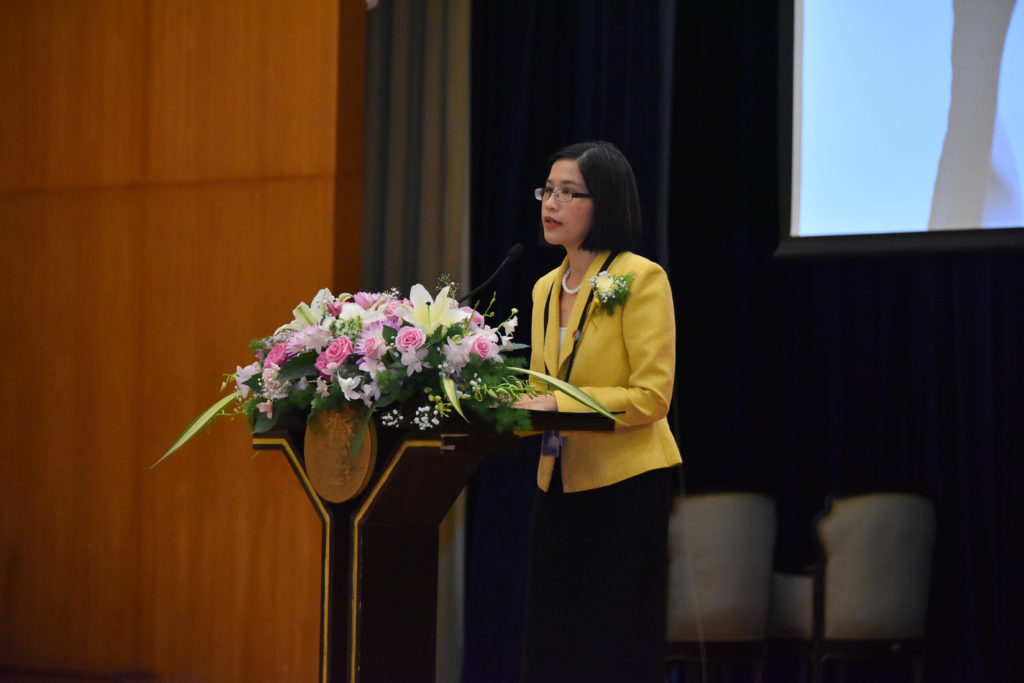
While business leaders agree with the need to expand the export market in ASEAN and the business benefits FTAs membership brings, they still have other concerns. First, the prevalent non-tariff barriers in each ASEAN country. And second, Thailand’s bureaucratic red tape which increases business costs and hinders Thailand’s trade competitiveness.
“It’s necessary to fix outdated rules and regulations which prevent the business sector from being competitive,” urged Mr Kalin Sarasin, chairman of the Thai Chamber of Commerce.
“State agencies also need to talk with each other for better coordination and policy implementation” he added, citing the opening delay of a Thailand-Myanmar bridge in Mae Sot to facilitate border trade.
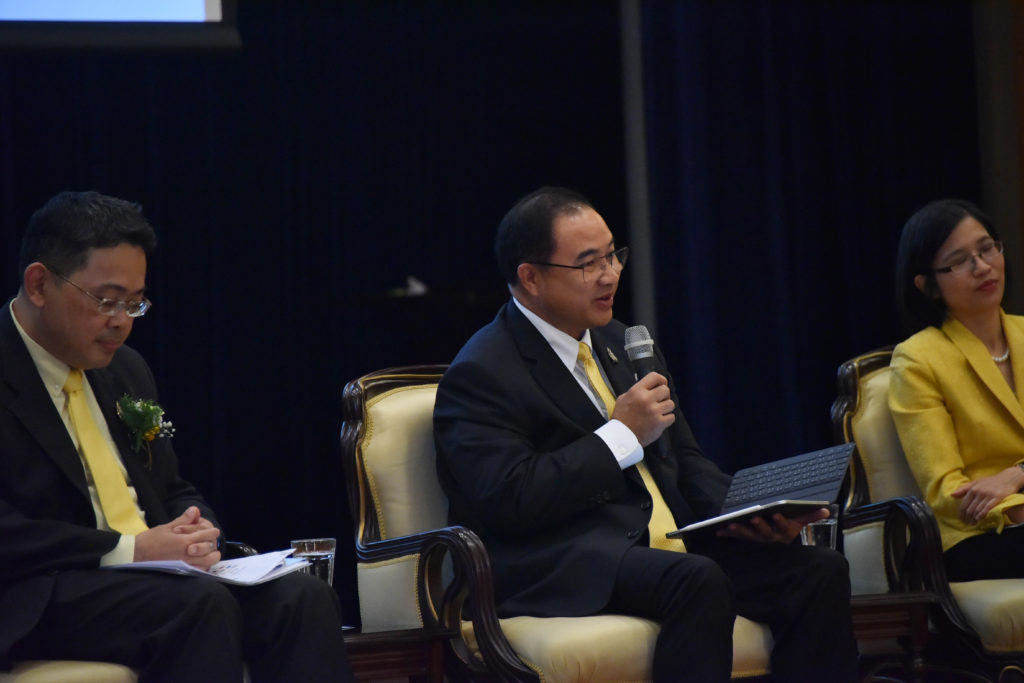
Given the inability to even meet the 3% export growth target this year, Ms Ghanyaphad Tantipipatpong, chairperson of the Thai National Shippers’ Council, expressed concerns about various non-tariff, protectionist measures in the ASEAN countries which hinder Thai exports.
And if China starts price dumping here, it will be difficult for Thailand to keep market strongholds in the CLMV countries which are Thailand’s biggest market within ASEAN, she said.
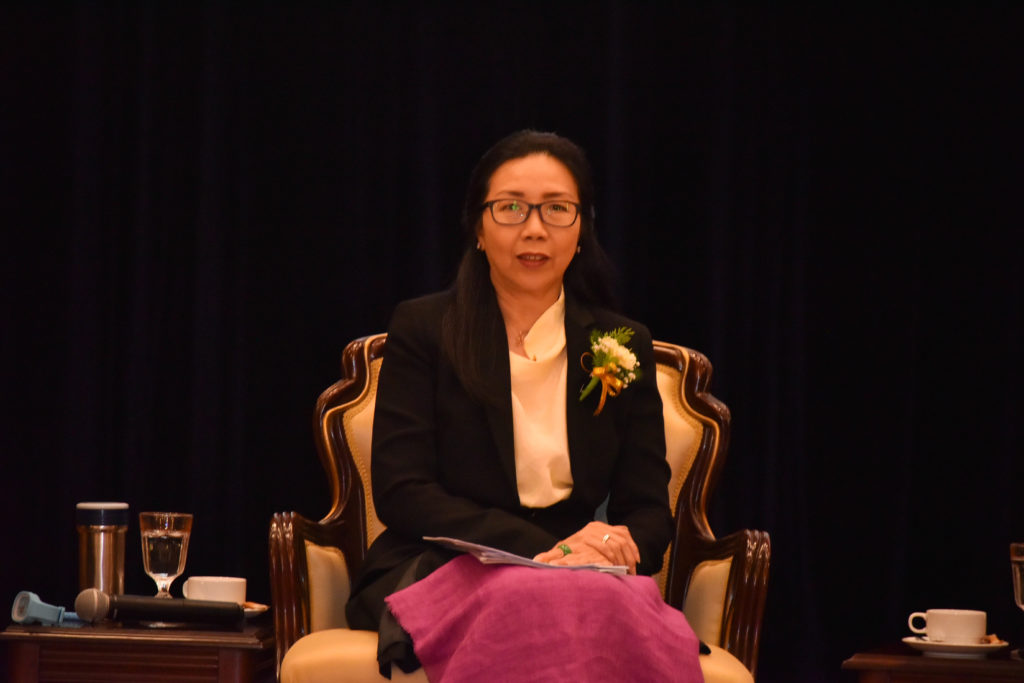
Despite the FTA enthusiasm from the government and business sectors, Ms Kankikar Kitiwatchakul, vice president of FTA Watch, a civil society group, urged careful studies before Thailand jumps in.
“Only 20% of the contents in free trade agreements deal with tariff reduction. The rest concerns issues on intellectual property rights which will hit Thai people hard if adopted,” she said.
For example, medicines will become much more expensive if the terms of drug patents are extended for another five years and the Thai government cannot produce generic drugs to save lives under the CPTPP requirements. Consequently, the country’s universal health care system will be severely affected.
Joining the UPOV 1991 treaty under CPTPP requirements will allow plant breeders to use local species without having to share benefits with local communities, she charges.
Apart from making seeds potentially more expensive, farmers are also prohibited and subject to legal punishment if they keep commercial seeds to breed for their new planting seasons. This prohibition undermines farmers’ traditional practices and innovations and only further strengthen agro giants’ seed monopoly, insisted FTA Watch.
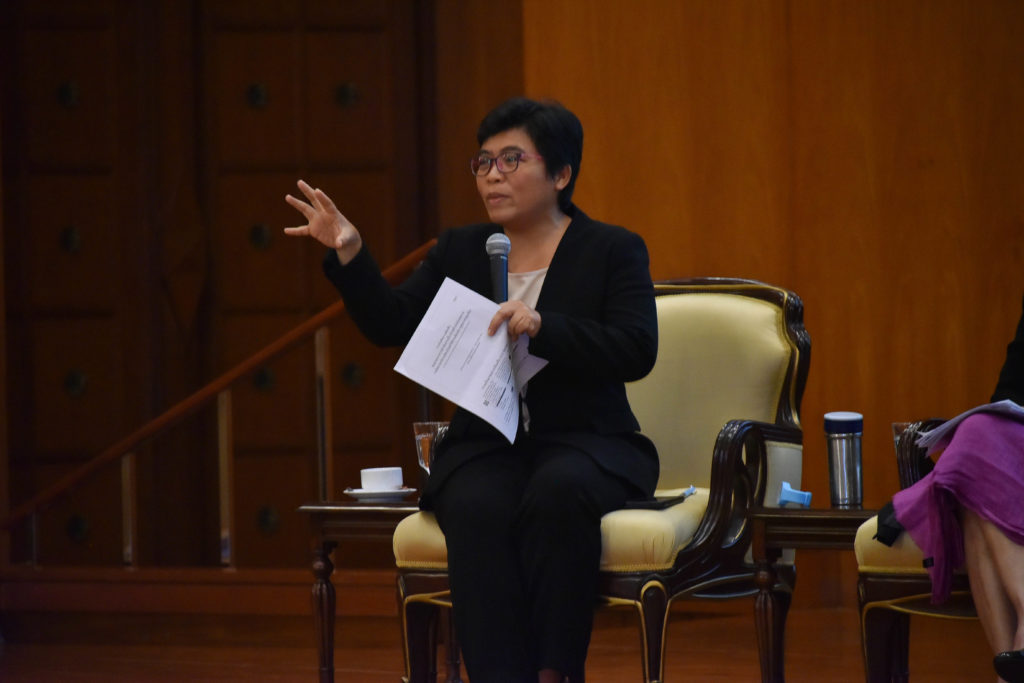
Ms Kannikar also cautioned against allowing “recyclable” products into the country because it will eventually make Thailand the dumping site of toxic waste. Welcoming polluting foreign investment is also harmful to the environment, she added.
According to Ms Arjaree Sriratanaban, the concern on toxic waste can be addressed through existing law against hazardous chemicals.
As a country heavily dependent on export revenues, it is very difficult for Thailand not to join free trade agreements, said Mr Ratchavitch, Permanent Representative of Thailand to the WTO and the World Intellectual Property Organization (WIPO).
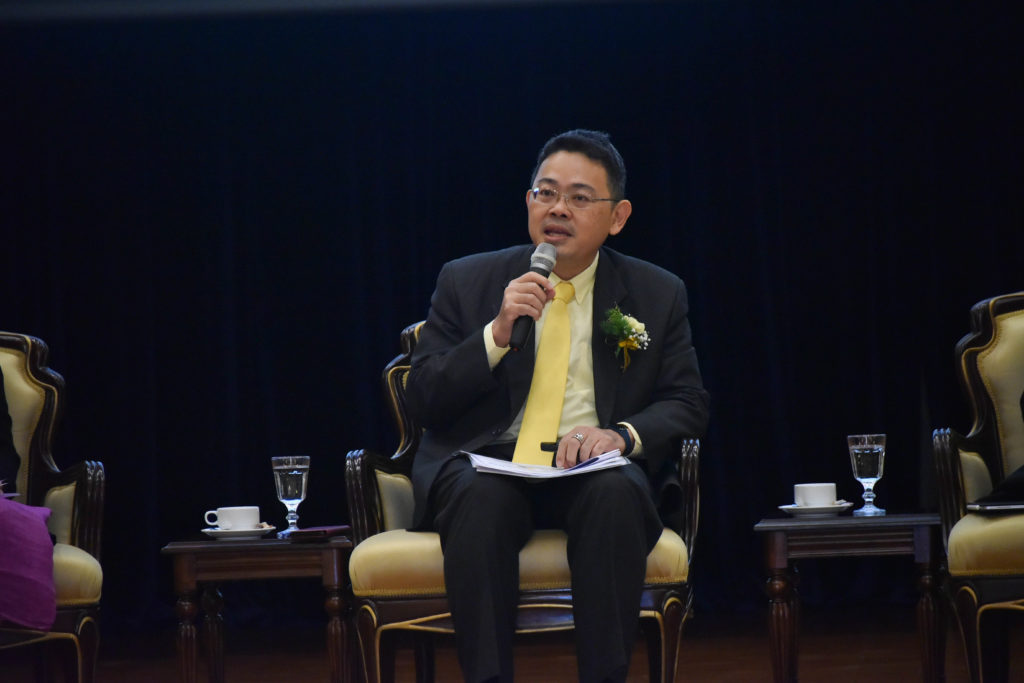
“We need to keep existing markets and find new ones to survive, knowing that we can longer depend on the WTO.”
“But we must be aware that joining free trade agreements is not our final answer.
“FTAs are useful, but we also need to think other measures such as adding more value to our products, stabilising exchange rates, and keeping competitiveness in the international markets,” he said.
Overdependence on export makes Thailand vulnerable economically, he said. “Eventually, Thailand needs to think long-term about finding a new economic model that is more sustainable.”
